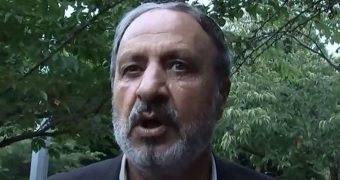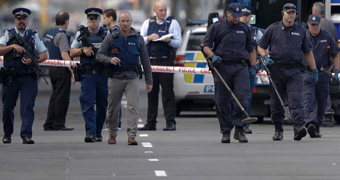Muslims attending mosques during holy month of Ramadan fear ongoing hate crimes
By
Zena Chamas
Posted 2ddays ago, updated 2ddays ago
The Islamic month of Ramadan is set to begin on April 12, but will be confirmed early that morning.(
ABC Radio Sydney: Dayvis Heyne
)
Share
For most Muslims around the world,
the Islamic holy month of Ramadan is a time for peaceful worship. But as the auspicious month draws near, some of Australia's mosque leaders fear the worst after enduring years of hate crimes.
Key points:
- Research shows more than half of 75 mosques surveyed across Australia had experienced targeted violence
- The month of Ramadan is a time of worship, where communities gather at mosques for prayers after fasting
- Last year COVID-19 prevented Muslims from visiting mosques during Ramadan, but despite their reopening, many remain cautious
Brisbane's Holland Park Mosque leader Ali Kadri told the ABC that he's so worried about repeated hate crimes targeting the mosque that he believes it's only a matter of time before what happened at the
Al-Noor mosque in Christchurch in 2019 is repeated.
"If we continue the path we're going, and continue to ignore the real threat, which is posed by these [right-wing extremists], It's not a matter of if, it's a matter of when," he said, when asked if his mosque could face a similar attack.
Worshipers attending the mosque, which is one the oldest Islamic buildings in Australia, have also got concerns, Mr Kadri said, adding it's become "quite normal" for mosque-goers to endure weekly drive-bys where racist slurs are yelled at them out of car windows.
Graffiti that was written on parts of the Holland Park Mosque in Brisbane. (
Supplied: Ali Kadri
)
But the Brisbane mosque is not alone, as
2021 research from Charles Sturt University shows more than half of the 75 mosques surveyed in Australia experienced targeted violence between 2014 and 2019.
'I saw dead people everywhere'

Mosque shooting survivors describe screaming and terror, 'dead people everywhere' as gunman opened fire.
Read more
The types of violence included arson, physical assault of attendees, graffiti, vandalism, verbal abuse, and online abuse. In some extreme cases, some mosques received hate mail and death threats, according to the research.
"[Hate crimes] are quite common and a lot of people — especially women who wear hijab — are reluctant and afraid to go out in public in certain areas because they're afraid that somebody is going to vilify them, or either racially [verbally] or physically attack them," Mr Kadri said.
In 2019 alone, roughly a third of the mosques included in the study said they had experienced a graffiti attack, 17 per cent reported two or more instances, and 12 per cent experienced one or more arson attacks. One mosque reported six incidents in that year alone, research showed.
Usually, the Islamic month of Ramadan – which is set to begin April 12 but will be confirmed that morning – is a time of peace and serenity, where communities regularly gather at mosques for prayers after fasting from food and water from dawn til dusk. But this year there's a sense of hesitation.
Holland Park's mosque walls were spray-painted with "St Tarrant" in tribute to the Christchurch mosque shooter.(
Supplied: Ali Kadri
)
In 2019, the Holland Park Mosque suffered its worst attack yet. It was vandalised with graffiti with the words "St Tarrant" spray-painted on walls paired with a swastika, in tribute to the Christchurch mosque shooter.
In a recent statement sent to the ABC, Queensland Police said the incident was "thoroughly investigated" by the QPS Counter Terrorism Command Security Operations Unit and investigations are ongoing with no charges made.
It said QPS within the South Brisbane District work with members of the Brisbane Islamic community "to help identify and address any criminal or anti-social behaviour which may impact upon the community" and urged members of the Islamic community to contact police "if they have identified any of these issues."
It also added if members feel " threatened or fearful by the actions of others" to contact police.
However, despite the attacks, the mosque also received a tremendous amount of support from neighbouring communities, with dozens of flowers and messages of sympathy left outside the mosque's gates after the Christchurch shootings.
Dozens of flowers were left outside the mosque after the Christchurch shootings.(
Supplied: Ali Kadri
)
In 2017, the Islamic College of Brisbane — where Mr Kadri is chief executive — had a bloodied, decapitated pig's head
dumped on its doorstep, causing panic to students and parents.
And just a few weeks ago Mr Kadri was the victim of a personal hate crime, after he was allegedly attacked and racially vilified at a local park where he was playing with his eight-year-old niece.
He alleged a shirtless man came up to him shouting racist slurs and called him an "Indian slave" before throwing a cup of wine at him and his niece.
He reported the incident to police.
"People are afraid to go out, especially if they're visibly identified as different," Mr Kadri said.
"And that fear is very real. It's very widespread and, it's creating a very scary environment."
Many Muslims go to the mosque with a 'back-up plan'
Last year COVID-19 hampered worshipers from attending mosques during Ramadan, with nationwide closures of religious centres and mosques due to restrictions. But despite the excitement that mosques are now open again, many still remain cautious.
Senior lecturer and researcher at the Centre for Islamic Studies and Civilisation at Charles Sturt University, Derya Iner, said many Muslims feel more comfortable reporting hate crimes through an anonymous database, such as the Islamophobia Register Australia, where she is an executive board member.
Through this database, Ms Iner has seen reports made by Muslims saying that they go to the mosque with a "back-up plan" in case of an attack. These comments only increased after the Christchurch shootings.
"Some particular mosques are subject to repeat attacks, and that is really concerning," she said.
"Instead of focusing on prayers, [many felt] they needed to check for exit doors, just in case."
Despite the excitement that mosques have now reopened after COVID-19 restrictions, many remain cautious. (
Supplied: Adel Salman
)
Mr Kadri said not enough is being done to combat hate groups creating fear, as hate crimes are not taken as seriously by security authorities, such as the Australian Security Intelligence Organisation (ASIO).
"We are always careful. Most mosques now have heavy security, we have cameras. I do know for a fact that police have actually requested for plans of the mosque, just in case there is an attack."
In a statement sent to the ABC, an ASIO spokesperson said the security intelligence agency investigates individuals or groups based on their use or advocacy of violence.
While they could not comment on intelligence matters, a threat of “ideologically motivated violent extremism in Australia is real and growing,” the statement said.
“While the extreme and violent right wing has been in ASIO’s sights for many decades, we are dedicating additional resources to the evolving threat and it represents a growing proportion of our priority counter-terrorism caseload,” it added.
Anti-Muslim groups still on Facebook despite calls to ban them
According to Ms Iner, her research has shown that hate speech both online and in-person feed into each other and can be very dangerous to the Muslim community.
"Associations and connections are really becoming harmful because what makes us and [brings us together] are our thoughts, our beliefs, our ideologies, but if you're constantly feeding them through social media, it may one day end up in physical attack," she said.
That's a call that Muslim advocacy groups back.
They believe right-wing hate groups on social media that are still allowed to be active can contribute to anti-Muslim sentiment, creating serious security risks.
The Australian Muslim Advocacy Network (AMAN) has called on Facebook and Twitter to shut down right-wing extremist groups and their pages actively spreading hate.
Christchurch shootings timeline

At least 40 people are believed to have been killed in shootings at two separate mosques in the New Zealand city of Christchurch. Here's what we know about how they unfolded.
Read more
Facebook is the largest home to anti-Muslim hate communities, AMAN spokeswoman Rita Jabri-Markwell said.
"There's a legal vacuum because we don't have anything under online safety [to protect us]. The only laws we have to work with are anti-discrimination laws, which are very time-consuming to sift through," she said.
Racism online can be harder to prove without enough evidence of intent to incite violence. But cyber racism is classified as an act of racism under the Racial Discrimination Act.
AMAN wrote a formal letter to the head of Facebook Australia and New Zealand asking the social media platform to condemn the use of anti-Muslim dehumanisation on their platforms.
In a statement to the ABC, Facebook Australia and New Zealand’s director of public policy, Mia Garlick, said there was “more work to do” in combating hate speech against the Muslim community, and that they appreciate feedback from AMAN and others as they refine their policies.
“We have policies in place to protect communities on Facebook and invest significantly in technology and resources to help us enforce these [sic]," Ms Garlick said.
"Our policies prohibit hate speech on Facebook and we’re working to address more implicit hate speech and violent content, including combating attacks against the Muslim community."
Muslim community not backing down
Batul Gulani, a prominent female leader in Australia's Shi'ite Muslim community, said Ramadan can be an exciting time to promote messages of unity to others.
A Muslim charity organisation she chairs, the AMAFHH Federation, hosts an annual dinner for Muslims and non-Muslims during Ramadan to combat discrimination and tackle issues of hate towards Muslims.
"It's a chance for multicultural faiths and religions to come together under one roof to start understanding each other," she said.
“There are many small things we can implement outside the mosque that promotes inclusion in the community.”
Every Ramadan for the past six years the AMAFHH Federation has hosted a dinner bringing together all members of the community. (
Supplied
)
While some of Victoria's mosques have been subjected to hate crimes and vandalism, the Islamic Council of Victoria's (ICV) spokesperson Adel Salman said the Muslim community keeps on bouncing back.
He said the Muslim community remained cautious, but not to the degree of letting it interrupt plans to worship at the mosque this Ramadan.
“There’s a general level of anxiety and trepidation because the impact of Christchurch still runs deep in the Muslim community, but I wouldn’t say it’s necessarily forcing people to change their behaviours," he said.
A prayer hall at one of Melbourne's city mosques, which at prayer time is usually packed full of worshipers. (
Supplied: ICV
)
"What happened in Christchurch has left a deep scar on many Muslims, if it can happen in Christchurch it could happen anywhere.
"That’s always in the back of people’s minds, but is it forcing people to not go to mosques? No, I don’t think so."
He said the Muslim community was not completely naive of possible attacks but mosques were open places and it was part of Islamic practice to keep them open.
"The Muslim community is not going to let fear ruin their worship," he said.
"We’re still going to live our lives and our mosques will remain open and welcome to all."
Posted 2ddays ago, updated 2ddays ago






